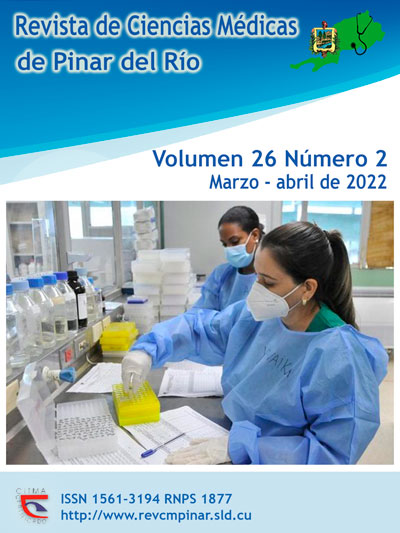Educational actions for pedagogical-developmental learning with medical students
Keywords:
DEVELOPER TRAINING, COMMUNICATION, DIDACTIC, MOTIVATION.Abstract
Introduction: the teaching-learning process demands educational actions aimed at achieving a pedagogical-developmental learning with students from the first-academic-year of medicine major.
Objective: to design educational actions for a pedagogical developmental learning with medicine major students.
Methods: a cross-sectional descriptive study was conducted during the period from June 2020 to November 2021. The population consisted of 40 first-academic-year medicine major students. Theoretical, systemic, historical-logical and analytical-synthetic methods were used, as well as empirical methods: documentary analysis and a questionnaire to students.
Results: it was found through the results that in the teaching-learning process, students use features of rote learning, they admit not knowing how to identify the essence of contents and have difficulties in communication regarding how to learn.
Conclusions: the need to use educational actions for the achievement of a pedagogical-developmental learning in students from the teaching-educational context was confirmed.
Downloads
References
1. Nolla Cao N. Instrumento para la evaluación y certificación del diseño curricular. Educación Médica Superior [Internet]. 2004 [citado 20/11/2021]; 18(3): 1-1. Disponible en: http://scielo.sld.cu/scielo.php?script=sci_arttext&pid=S0864-21412004000300006&lng=es&tlng=es
2. Manzana M. Los desafíos de la Administración en el Siglo XXI, de Peter F. Drucker. Escr. Contab. Adm [Internet]. 2019 [citado 20/11/2021]; 10(2): 113-119. Disponible en: http://bibliotecadigital.uns.edu.ar/scielo.php?script=sci_arttext&pid=S1853-20552019002200005&lng=es&nrm=iso
3. Miranda-Hernández K. Fundamentos de un sistema de herramientas para la gestión del conocimiento en la formación médica. Revista de Ciencias Médicas de Pinar del Río [Internet]. 2017 [citado 20/11/2021]; 21(1):70-80. Disponible en: http://revcmpinar.sld.cu/index.php/publicaciones/article/view/2956
4. Álvarez de Zayas CM. Hacia una escuela de excelencia [Internet]. La Habana: Pueblo y Educación; 1995 [citado 20/11/2021]. Disponible en https://www.buenastareas.com/ensayos/Hacia-Una-Escuela-De-Excelencia/2220834.html
5. Fuentes HC. La concepción científica holístico configuracional. Una alternativa en la construcción del conocimiento científico. Su aplicación en la formación de los profesionales de la Educación Superior en la contemporaneidad [Tesis Doctoral]. Santiago de Cuba; 2009. [citado 20/11/2021]. Disponible en: http://cidc.udistrital.edu.co/investigaciones/documentos/revistacientifica/rev5/vol2/1La%20formacion.pdf
6. Cervera. Material Educativo [Internet]. México DF; 2014 [citado 20/11/2021]. Disponible en: http://www.iideac.edu.mx
7. Bono A. Los docentes como engranajes fundamentales en la promoción de la motivación de sus estudiantes. Revista Iberoamericana de Educación [Internet]. 2010 [citado 20/11/2021]; 54(2). Disponible en: https://rieoei.org/RIE/article/view/1676
8. Hérnández R, Férnandez C, Baptista P. Metodología de la Investigación. 6ta ed. México D.F: Mc Graw-Hill Editorial; 2015.
9. García I. El consentimiento informado; una acción imprescindible en la investigación médica. Rev Cubana Estomatol [Internet]. 2009 [citado 20/11/2021]; 46(1). Disponible en: http://www.bvs.sld.cu/revistas/est/vol46_1_09/est07109.htm
10. Bermúdez SR, Rodríguez RM. Algunas consideraciones teóricas para el tratamiento metodológico de habilidades básicas en la Educación Superior. Educ Med Super [Internet]. 2003 [citado 20/11/2021]; 23(1): 39-46. Disponible en: https://dialnet.unirioja.es/servlet/articulo?codigo=2432408
11. Cuba, Constitución de la República. Capítulo V: Educación y Cultura. Gaceta Oficial. Publicación digital. Capítulo V. La Habana: Educación y Cultura; 2011.
12. Cuba. Ministerio de Salud Pública. Ley No. 41 sobre la salud pública [Internet]. La Habana; 13 de junio 1983 [citado 20/11/2021]. Disponible en: http://legislacion.sld.cu/index.php?P=FullRecord&ID=2
13. República de Cuba. Sistema de evaluación y acreditación de carreras universitarias (SEA-CU). Manual de implementación. La Habana: Junta de acreditación nacional; 2014.
14. Cuba, Ministerio de Educación Superior. Reglamento de Trabajo Docente y Metodológico de la Educación Superior. Resolución No. 2/18. Gaceta Oficial No 25 de la República. La Habana, GOC-2018-460-025.
15. Montejo-Lorenzo MN. La investigación pedagógica. Otra Mirada por Alberto D. Valle Lima. Transformación [Internet]. 2017 [citado 20/11/2021]; 13(3): 442-444. Disponible en: http://scielo.sld.cu/scielo.php?script=sci_arttext&pid=S2077-29552017000300013
16. Damiani S. Motivación inicial por la atención primaria de salud en los estudiantes de medicina. Educ Med Super [Internet]. 2004 [citado 20/11/2021]; 18(3): 1-1. Disponible en: http://scielo.sld.cu/scielo.php?script=sci_arttext&pid=S0864-21412004000300003&lng=es&nrm=iso&tlng=es
17. Escobar Carmona E, Madiedo Albolatrachs M, Puga García A, Fardales Macía V, Pérez Mateo A. Organización didáctico-metodológica de la conferencia como sistema integrado en la unidad curricular de Morfofisiología Humana I. [Internet]. 2013 [citado 20/11/2021]; 27(3): 176-188. Disponible en: http://scielo.sld.cu/scielo.php?script=sci_arttext&pid=S0864-21412013000300003&lng=es&nrm=iso&tlng=es
18. Chi Maimó A, Pita García A, Sánchez González M. Fundamentos conceptuales y metodológicos para una enseñanza-aprendizaje desarrolladora de la disciplina Morfofisiología Humana. [Internet]. 2015 [citado 20/11/2021]; 25(1): 3-13. Disponible en: http://scielo.sld.cu/pdf/ems/v25n1/ems02111.pdf
Downloads
Published
How to Cite
Issue
Section
License
Authors who have publications with this journal agree to the following terms: Authors will retain their copyrights and grant the journal the right of first publication of their work, which will be publication of their work, which will be simultaneously subject to the Creative Commons Attribution License (CC-BY-NC 4.0) that allows third parties to share the work as long as its author and first publication in this journal are indicated.
Authors may adopt other non-exclusive license agreements for distribution of the published version of the work (e.g.: deposit it in an institutional telematic archive or publish it in a volume). Likewise, and according to the recommendations of the Medical Sciences Editorial (ECIMED), authors must declare in each article their contribution according to the CRediT taxonomy (contributor roles). This taxonomy includes 14 roles, which can be used to represent the tasks typically performed by contributors in scientific academic production. It should be consulted in monograph) whenever initial publication in this journal is indicated. Authors are allowed and encouraged to disseminate their work through the Internet (e.g., in institutional telematic archives or on their web page) before and during the submission process, which may produce interesting exchanges and increase citations of the published work. (See The effect of open access). https://casrai.org/credit/



